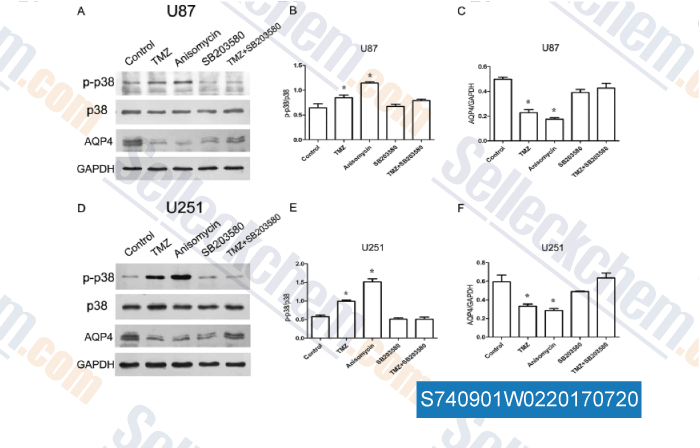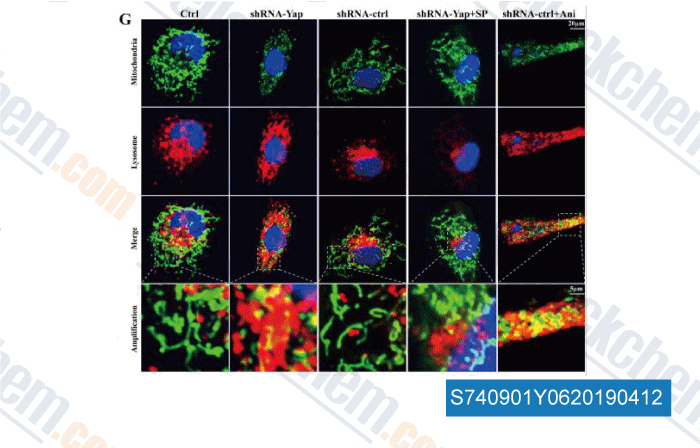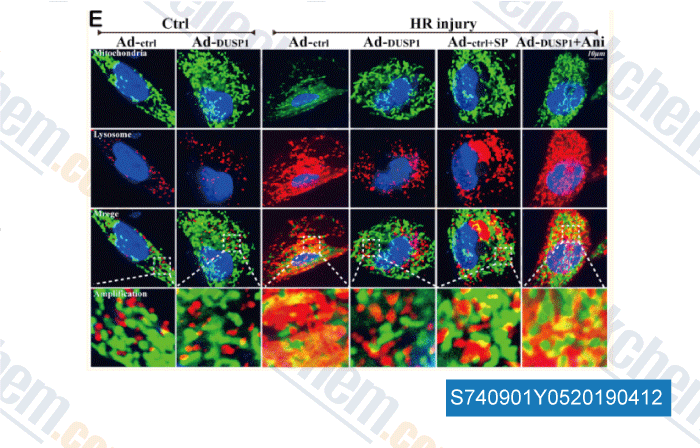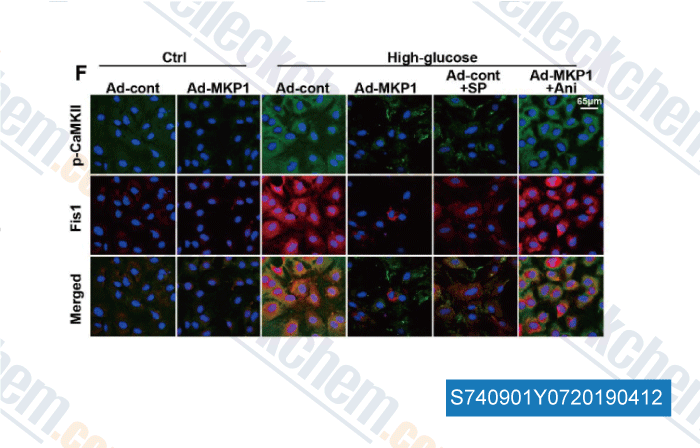|
Toll Free: (877) 796-6397 -- USA and Canada only -- |
Fax: +1-832-582-8590 Orders: +1-832-582-8158 |
Tech Support: +1-832-582-8158 Ext:3 Please provide your Order Number in the email. |
Technical Data
| Formula | C14H19NO4 |
|||
| Molecular Weight | 265.3 | CAS No. | 22862-76-6 | |
| Solubility (25°C)* | In vitro | DMSO | 53 mg/mL (199.77 mM) | |
| Ethanol | 53 mg/mL (199.77 mM) | |||
| Water | 2 mg/mL (7.53 mM) | |||
|
* <1 mg/ml means slightly soluble or insoluble. * Please note that Selleck tests the solubility of all compounds in-house, and the actual solubility may differ slightly from published values. This is normal and is due to slight batch-to-batch variations. * Room temperature shipping (Stability testing shows this product can be shipped without any cooling measures.) |
||||
Preparing Stock Solutions
Biological Activity
| Description | Anisomycin (Flagecidin, Wuningmeisu C) is a bacterial antibiotic isolated from Streptomyces griseolus, which inhibits protein synthesis, and also act as a JNK activator. Anisomycin upregulates autophagy and increases apoptosis. | |
|---|---|---|
| Targets |
|
|
| In vitro | Anisomycin (3 μM) decreases protein synthesis in MDA16 and MDA-MB-468 cells, and reduces colony formation by MDA-MB-468 cells. Anisomycin causes an increase in the number of apoptotic cells in MDA-MB-468 cultures, but not in MDA16 cultures. Anisomycin actives JNK phosphorylation in MDA-MB-468 cells.[2] In U251 and U87 cells, anisomycin (0.01-8 μM) inhibits the cell growth in time- and concentration-dependent manners with the IC50 (48 h) values of 0.233 and 0.192 μmol/L, respectively. Anisomycin (4 μM) causes 21.5% and 25.3% of apoptosis proportion in U251 and U87 cells, respectively, and activates p38 MAPK and JNK, while inactivated ERK1/2. Anisomycin (4 μM) reduces the level of PP2A/C subunit in a time-dependent manner in U251 and U87 cells.[3] Anisomycin inhibits EAC cell proliferation in concentration-dependent manner.[4] | |
| In vivo | Peritumoral administration of anisomycin (5 mg/kg) significantly suppresses Ehrlich ascites carcinoma (EAC) growth resulting in the survival of approximately 60% of the mice 90 days after EAC inoculation.[4] |
Protocol (from reference)
| Kinase Assay:[2] |
|
|---|---|
| Cell Assay:[4] |
|
| Animal Study:[4] |
|
References
Customer Product Validation

-
, , J Cell Biochem, 2017, 118(12):4905-4913

-
Data from [Data independently produced by , , Redox Biol, 2018, 14:59-71]

-
Data from [Data independently produced by , , Redox Biol, 2018, 14:576-587]

-
Data from [Data independently produced by , , Cell Physiol Biochem, 2018, 51(4):1778-1798]
Selleck's Anisomycin has been cited by 80 publications
| Disrupting AGR2/IGF1 paracrine and reciprocal signaling for pancreatic cancer therapy [ Cell Rep Med, 2025, 6(2):101927] | PubMed: 39914384 |
| Portimine A toxin causes skin inflammation through ZAKα-dependent NLRP1 inflammasome activation [ EMBO Mol Med, 2025, 10.1038/s44321-025-00197-4] | PubMed: 39948420 |
| Transcriptional landscape and predictive potential of long noncoding RNAs in peritoneal recurrence of gastric cancer [ Mol Cancer, 2024, 23(1):284] | PubMed: 39736670 |
| The DNA-dependent protein kinase catalytic subunit exacerbates endotoxemia-induced myocardial microvascular injury by disrupting the MOTS-c/JNK pathway and inducing profilin-mediated lamellipodia degradation [ Theranostics, 2024, 14(4):1561-1582] | PubMed: 38389837 |
| DNA-PKcs Phosphorylates Cofilin2 to Induce Endothelial Dysfunction and Microcirculatory Disorder in Endotoxemic Cardiomyopathy [ Research (Wash D C), 2024, 7:0331] | PubMed: 38550779 |
| Cell mechanics regulate the migration and invasion of hepatocellular carcinoma cells via JNK signaling [ Acta Biomater, 2024, S1742-7061(24)00036-9] | PubMed: 38272199 |
| Inhibition of the HMGB1/RAGE axis protects against cisplatin-induced ototoxicity via suppression of inflammation and oxidative stress [ Int J Biol Sci, 2024, 20(2):784-800] | PubMed: 38169643 |
| Melatonin alleviates high-fat-diet-induced dry eye by regulating macrophage polarization via IFT27 and lowering ERK/JNK phosphorylation [ iScience, 2024, 27(7):110367] | PubMed: 39100927 |
| Short-term tamoxifen administration improves hepatic steatosis and glucose intolerance through JNK/MAPK in mice [ Signal Transduct Target Ther, 2023, 8(1):94] | PubMed: 36864030 |
| A semiconductor 96-microplate platform for electrical-imaging based high-throughput phenotypic screening [ Nat Commun, 2023, 14(1):7576] | PubMed: 37990016 |
RETURN POLICY
Selleck Chemical’s Unconditional Return Policy ensures a smooth online shopping experience for our customers. If you are in any way unsatisfied with your purchase, you may return any item(s) within 7 days of receiving it. In the event of product quality issues, either protocol related or product related problems, you may return any item(s) within 365 days from the original purchase date. Please follow the instructions below when returning products.
SHIPPING AND STORAGE
Selleck products are transported at room temperature. If you receive the product at room temperature, please rest assured, the Selleck Quality Inspection Department has conducted experiments to verify that the normal temperature placement of one month will not affect the biological activity of powder products. After collecting, please store the product according to the requirements described in the datasheet. Most Selleck products are stable under the recommended conditions.
NOT FOR HUMAN, VETERINARY DIAGNOSTIC OR THERAPEUTIC USE.
